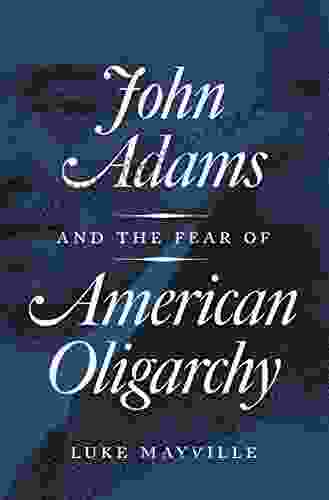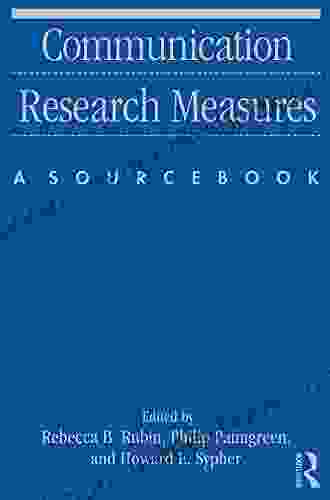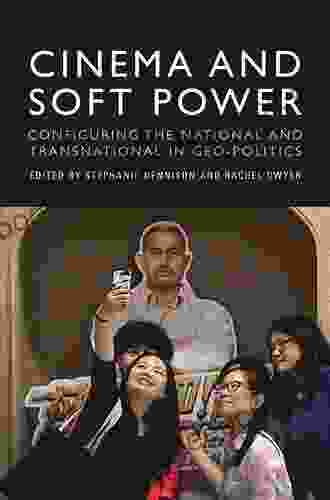Taiwan Cinema As Soft Power: Authorship, Transnationality, Historiography

In recent decades, Taiwan cinema has emerged as a significant form of soft power, contributing to the global recognition and appreciation of Taiwan's culture and values. This essay examines the multifaceted role of Taiwan cinema as a soft power tool, exploring three key aspects: authorship, transnationality, and historiography. 4.8 out of 5 First, this essay discusses the impact of internationally recognized Taiwanese directors such as Hou Hsiao-hsien, Ang Lee, Edward Yang, and Tsai Ming-liang. These directors have garnered critical acclaim and awards at major international film festivals, showcasing the exceptional artistic talent and creativity of Taiwanese filmmakers. Second, this essay analyzes the role of Taiwan cinema in fostering transnational connections and cultural exchange. Taiwanese films have gained popularity across borders, resonating with audiences worldwide through their universal themes and innovative storytelling techniques. This transnationality has extended Taiwan's cultural reach, contributing to its global visibility and understanding. Finally, this essay examines the historical significance of Taiwan cinema in shaping the nation's identity. Films have played a crucial role in documenting Taiwan's history, preserving its collective memory, and articulating its cultural values. Through a close examination of key historical films, this essay explores how Taiwan cinema has contributed to the formation of a distinct Taiwanese national consciousness. The authorship of a film is crucial in shaping its artistic vision and cultural significance. In the context of Taiwan cinema, auteurs such as Hou Hsiao-hsien, Ang Lee, Edward Yang, and Tsai Ming-liang have gained international recognition for their distinctive styles and innovative storytelling techniques. Hou Hsiao-hsien, known for his long takes and minimalist aesthetics, has created a body of work that explores Taiwan's history and culture. His films, such as City of Sadness (1989) and Flowers of Shanghai (1998),have won numerous international awards and established him as one of the most influential directors in contemporary cinema. Ang Lee, a two-time Oscar winner, has gained global recognition for his diverse body of work, including Crouching Tiger, Hidden Dragon (2000) and Brokeback Mountain (2005). His films seamlessly blend Eastern and Western elements, showcasing the versatility and adaptability of Taiwanese cinema. Edward Yang, a master of realism, explored the complexities of urban life in Taipei in his films Taipei Story (1985) and A Brighter Summer Day (1991). His films offer a nuanced and deeply personal perspective on Taiwan's modernization and social transformation. Tsai Ming-liang, known for his experimental and visually striking films, has gained a cult following internationally. His films, such as Vive L'Amour (1994) and The Wayward Cloud (2005),explore themes of alienation, isolation, and the human condition. The authorship of these Taiwanese directors has significantly contributed to the global recognition and appreciation of Taiwan cinema. Their unique styles and storytelling techniques have set them apart from other filmmakers, establishing Taiwan as a hub of artistic excellence. Taiwan cinema has transcended national boundaries, gaining popularity and recognition across borders. This transnationality has extended Taiwan's cultural reach and contributed to its global visibility and understanding. Taiwanese films have been widely distributed and screened at international film festivals, garnering critical acclaim from both audiences and critics. Directors such as Hou Hsiao-hsien, Ang Lee, and Edward Yang have gained global recognition for their unique storytelling techniques and universal themes. Beyond film festivals, Taiwanese films have also found success in commercial distribution. Ang Lee's Crouching Tiger, Hidden Dragon (2000) became the highest-grossing foreign-language film in the United States, demonstrating the global appeal of Taiwan cinema. The transnationality of Taiwan cinema has fostered a sense of cultural exchange and dialogue. Taiwanese films have resonated with audiences worldwide, offering unique perspectives on history, culture, and the human condition. This exchange has enriched the global cinematic landscape and contributed to the appreciation of diversity and cultural difference. Taiwan cinema has played a significant role in shaping the nation's identity, documenting its history, and preserving its collective memory. Films have served as historical artifacts, capturing key moments and events that have shaped Taiwan's political, social, and cultural landscape. The New Taiwan Cinema movement of the 1980s played a crucial role in redefining Taiwanese identity after decades of martial law. Films such as Hou Hsiao-hsien's The Boys from Fengkuei (1983) and Edward Yang's Taipei Story (1985) explored Taiwan's history and social issues, contributing to a new sense of national consciousness. Other films, such as Chen Kuo-fu's Touch of Zen (2003) and Ang Lee's Lust, Caution (2007),have shed light on Taiwan's troubled past and its complex relationship with China. These films have sparked conversations about Taiwanese history and facilitated a better understanding of its cultural heritage. Through their historical significance and storytelling power, Taiwan cinema has become an indispensable tool for understanding Taiwan's past, present, and future. Films have shaped the nation's collective memory, preserving and celebrating its unique cultural identity. Taiwan cinema has emerged as a powerful form of soft power, contributing to the global recognition and appreciation of Taiwan's culture and values. Through the authorship of internationally recognized directors, the transnationality of its films, and its historical significance, Taiwan cinema has played a multifaceted role in shaping Taiwan's national identity and fostering cultural exchange. As Taiwan cinema continues to evolve and gain global recognition, it will undoubtedly continue to be a vital tool for advocating for Taiwan's interests, promoting its cultural heritage, and enhancing its global visibility. The power of Taiwan cinema lies in its ability to transcend borders, touching the hearts and minds of audiences worldwide.Language : English File size : 12552 KB Text-to-Speech : Enabled Screen Reader : Supported Enhanced typesetting : Enabled Word Wise : Enabled Print length : 244 pages Lending : Enabled Authorship
Transnationality
Historiography
4.8 out of 5
| Language | : | English |
| File size | : | 12552 KB |
| Text-to-Speech | : | Enabled |
| Screen Reader | : | Supported |
| Enhanced typesetting | : | Enabled |
| Word Wise | : | Enabled |
| Print length | : | 244 pages |
| Lending | : | Enabled |
Do you want to contribute by writing guest posts on this blog?
Please contact us and send us a resume of previous articles that you have written.
 Book
Book Page
Page Chapter
Chapter Story
Story Paperback
Paperback E-book
E-book Paragraph
Paragraph Shelf
Shelf Foreword
Foreword Preface
Preface Annotation
Annotation Footnote
Footnote Manuscript
Manuscript Tome
Tome Bestseller
Bestseller Classics
Classics Library card
Library card Narrative
Narrative Biography
Biography Autobiography
Autobiography Memoir
Memoir Reference
Reference Encyclopedia
Encyclopedia Resolution
Resolution Librarian
Librarian Card Catalog
Card Catalog Borrowing
Borrowing Study
Study Research
Research Scholarly
Scholarly Lending
Lending Reserve
Reserve Journals
Journals Interlibrary
Interlibrary Literacy
Literacy Study Group
Study Group Thesis
Thesis Storytelling
Storytelling Reading List
Reading List Theory
Theory Tansy Wilson
Tansy Wilson Marc Schonbrun
Marc Schonbrun Jason Brownlee
Jason Brownlee Jonathan Scheff
Jonathan Scheff Anne Perry
Anne Perry Karl Beckstrand
Karl Beckstrand Scott London
Scott London Carl Cota Robles
Carl Cota Robles Donal Daly
Donal Daly Randal Sloan
Randal Sloan Jean Racine
Jean Racine Frankie Poullain
Frankie Poullain Anwar El Homsi
Anwar El Homsi Matthew S Cox
Matthew S Cox Alison Ames
Alison Ames J P Reedman
J P Reedman William Robertson
William Robertson Natalie Bird
Natalie Bird Donald J Sobol
Donald J Sobol Stephane Edouard
Stephane Edouard
Light bulbAdvertise smarter! Our strategic ad space ensures maximum exposure. Reserve your spot today!

 Douglas PowellBilly Budd Maxnotes Literature Guides: A Comprehensive Companion for English...
Douglas PowellBilly Budd Maxnotes Literature Guides: A Comprehensive Companion for English...
 Jaime MitchellUnlocking the World of English: A Comprehensive Guide to House English for...
Jaime MitchellUnlocking the World of English: A Comprehensive Guide to House English for... Gustavo CoxFollow ·7.2k
Gustavo CoxFollow ·7.2k Yasushi InoueFollow ·10.3k
Yasushi InoueFollow ·10.3k George MartinFollow ·6.8k
George MartinFollow ·6.8k Travis FosterFollow ·10.4k
Travis FosterFollow ·10.4k Darren NelsonFollow ·5.2k
Darren NelsonFollow ·5.2k Jon ReedFollow ·14.6k
Jon ReedFollow ·14.6k Francisco CoxFollow ·4.8k
Francisco CoxFollow ·4.8k Leo TolstoyFollow ·19.8k
Leo TolstoyFollow ·19.8k

 Ralph Waldo Emerson
Ralph Waldo EmersonBWWM Enemies to Lovers Billionaire Romance: A Captivating...
In the realm of romance novels, the...

 Maurice Parker
Maurice ParkerJohn Adams and the Fear of American Oligarchy
John Adams, a...

 Bryce Foster
Bryce FosterTo Die but Once: A Haunting Maisie Dobbs Novel
Synopsis ...

 Manuel Butler
Manuel ButlerCommunication Research Measures Sourcebook Routledge...
Communication research measures are the...
4.8 out of 5
| Language | : | English |
| File size | : | 12552 KB |
| Text-to-Speech | : | Enabled |
| Screen Reader | : | Supported |
| Enhanced typesetting | : | Enabled |
| Word Wise | : | Enabled |
| Print length | : | 244 pages |
| Lending | : | Enabled |











